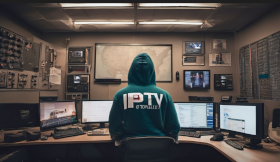-
chevron_right
16-Year-Old Pirate Site Prosecution Resurrected Despite Four Acquittals
news.movim.eu / TorrentFreak · Tuesday, 19 March - 19:23 · 5 minutes
 In 2007, Netflix shifted from distributing optical media via the mail to streaming content online. Apple released the first iPhone in the same year, but neither were quite ready to start squeezing the modern equivalent of the silver screen onto a 320×480 LCD panel.
In 2007, Netflix shifted from distributing optical media via the mail to streaming content online. Apple released the first iPhone in the same year, but neither were quite ready to start squeezing the modern equivalent of the silver screen onto a 320×480 LCD panel.
From a standing start alongside these innovative products in 2007, within a year SeriesYonkis would establish itself as one of Spain’s most-visited sites. Soon after, as the discontinued iPhone collapsed in the rear-view mirror in the summer of 2018, SeriesYonkis powered on to become one of the most popular ‘pirate’ sites in mainland Europe. That didn’t go unnoticed.
Hyperlinks vs. Hosting
Providing links to TV shows hosted on sites such as Megaupload may have been exciting for fans, but SeriesYonkis and movie-focused sister site PeliculasYonkis would soon feel the heat. When a black and white movie produced in Argentina was spotted by the rightsholder, a criminal complaint escalated into Spanish law enforcement action in 2009, and a search at the home of one of the site’s operators.
The search turned up nothing useful, at least when viewed through the eyes of Spanish law and how it was perceived at the time. SeriesYonkis was fueled by links to content hosted elsewhere, posted by users. There was no evidence to show that the site’s operators uploaded any content, or even checked the links to see if they actually worked.
The big struggle for rightsholders was a lack of clarity in Spanish law; specifically whether the mere provision of links amounted to a ‘communication to the public’, a regular feature of many copyright cases that have ended up at the Court of Justice of the European Union (CJEU).
Between 2007 and 2014, Spain’s Criminal Code had no definition for ‘communication to the public’ and when efforts were made to utilize provisions in the country’s Intellectual Property law, courts looked at other cases involving hyperlinks. All determined that linking did not amount to a communication to the public.
Court of Justice of the European Union on Hyperlinks
In February 2014, when dealing with the landmark case Svensson v Retriever Sverige AB , the CJEU set out the criteria for a communication to the public. Communication was defined as making works available in a way the public can access them. The term ‘public’ was clarified to mean a large number of people, who were not the original audience rightsholders had envisioned when they made the content available.
Importantly, the CJEU clarified that the provision of hyperlinks to protected content amounts to making content available.
Since making content available constitutes an act of communication, the people behind SeriesYonkis understood that this case, which didn’t directly involve them, certainly did now. Rightsholders did not envision their content reaching the users of SeriesYonkis via file-hosting sites for free, so that qualified as a ‘new public’ as defined by Europe’s highest court.
SeriesYonkis’ fate was sealed; Spain updated its laws with explicit reference to hyperlinks and before that came into force, SeriesYonkis shut itself down. Yet four years later, the men behind the site were on trial, facing years in prison and a claim for over half a billion euros in damages.
Not Guilty and Still Not Guilty
Following relentless legal pressure by several major Hollywood studios and their local proxies EGEDA and the Spanish Anti-Piracy Federation, four men went on trial in April 2019 for their work on SeriesYonkis, PeliculasYonkis and VideosYonkis (Series, Film, and Video Junkies).
Founder and original owner Alberto García and subsequent owners Alexis Hoepfner, Jordi Tamargo and David Martínez, faced a damages claim of 550 million euros and calls from Hollywood for prison sentences of up to four years each. The local prosecutor felt that two years would be sufficient.
For reasons directly linked to the CJEU ruling in Svensson, and the fact that the site’s operators shut everything down before Spain updated its law, Judge Isabel María Carrillo Sáez of Murcia’s Criminal Court said the men would not be going to prison, because they had committed no crimes.
The inevitable appeal, filed by the Public Prosecutor’s Office, Warner Bros, Paramount Pictures, Universal Studios and EGEDA, was subsequently rejected by the Murcia Provincial Court. Three magistrates ratified the decision handed down by the Murcia Criminal Court in 2019; still not guilty, all four remain acquitted.
Yet Another Appeal….
 According to a new report by
elDiario.es
, anti-piracy group EGEDA has filed an ‘amparo claim’ at the Constitutional Court against the acquittal of the men in 2021.
According to a new report by
elDiario.es
, anti-piracy group EGEDA has filed an ‘amparo claim’ at the Constitutional Court against the acquittal of the men in 2021.
Amparo is one of the main powers conferred by the Constitution to the Constitutional Court. The object of this process is the protection against breaches of the rights and freedoms enshrined in Articles 14 to 29 and 30.2 of the Constitution originated by provisions, legal acts, omissions or simple actions of the government of the State, the Autonomous Communities and other public bodies of territorial, corporate or institutional nature, as well as their staff.
The only claim that can be enforced through the amparo is the restoration or preservation of the rights or freedoms for which the appeal is lodged.
EGEDA’s claim, access to which was obtained by elDiario.es, states that by finding the operators of SeriesYonkis innocent on the basis detailed above, the Provincial Court of Murcia’s decision violated “their right to enjoy effective judicial protection.”
As a result they want the case examined again; the Constitutional Court has accepted.
Carlos Sánchez Almeida, a lawyer for one of the men behind SeriesYonkis, expressed the opinion that if anyone needs protection, his client is a prime candidate.
“Whoever needs effective judicial protection and all the rights of Article 24 of the Constitution is our client,” Almeida says.,
“He designed [SeriesYonkis] when he was a student, and for which he has suffered, is suffering and will suffer a 16-year bench sentence,” his response to the Constitutional Court reads.
“Basically, practically the entirety of his work and family life has been spent dealing with a lawsuit constantly threatening present and future plans, with media, mental, family and economic expenses that would wear down any person. And in the face of such suffering, an accusation puts an imaginary 550 million euros on the scales of justice, invoking the right to effective judicial protection of legal entities that produce cinematographic works.”
It could be several years before the Constitutional Court issues its verdict.
From: TF , for the latest news on copyright battles, piracy and more.

















